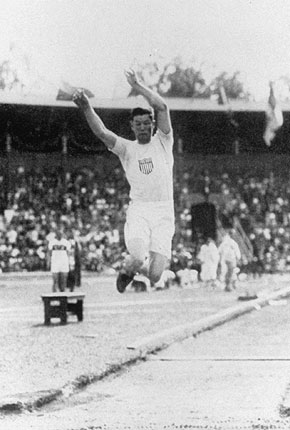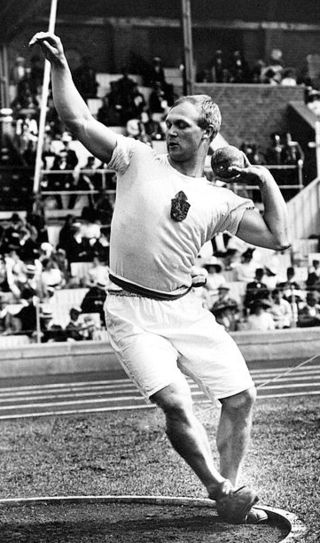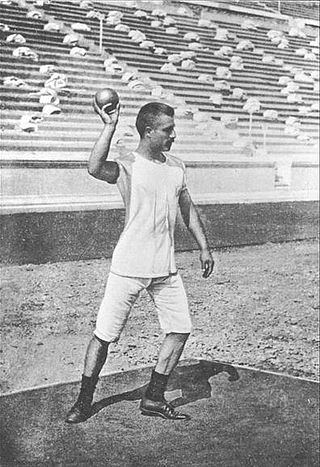
The men's discus throw was one of four men's throwing events on the Athletics at the 1964 Summer Olympics program in Tokyo. It was held on 15 October 1964. 29 athletes from 21 nations entered, with 1 additional athlete not starting in the qualification round. The maximum number of athletes per nation had been set at 3 since the 1930 Olympic Congress. The event was won by Al Oerter of the United States, the nation's fourth consecutive and 11th overall victory in the men's discus throw. Oerter became the first man to win three medals in the event, all of them gold. He was only the second person to win three consecutive gold medals in any individual athletics event. It was the third of his four consecutive wins in the event. Ludvik Danek of Czechoslovakia took silver to break up the Americans' two-Games dominance of the discus podium; no non-American had won a medal since 1952. Dave Weill earned bronze to make this the fourth straight Games that the United States had won at least two medals in the event.

The men's discus throw was one of six throwing events on the Athletics at the 1908 Summer Olympics programme in London. The competition was held on 16 July 1908. 42 throwers from eleven nations competed. NOCs could enter up to 12 athletes. The event was won by Martin Sheridan of the United States, his second consecutive victory in the event. The Americans completed their first sweep in the discus throw, with Merritt Giffin taking silver and Bill Horr bronze.
The men's discus throw event at the 2000 Summer Olympics as part of the athletics program was held at the Olympic Stadium on Sunday, 24 September and Monday, 25 September. Forty-five athletes from 28 nations competed. The event was won by Virgilijus Alekna of Lithuania, the nation's second victory in the men's discus throw. Lars Riedel of Germany took silver, becoming the 13th man to win multiple discus throw medals. Frantz Kruger earned South Africa's first medal in the event with his bronze.

Finland competed at the 1912 Summer Olympics in Stockholm, Sweden. The Grand Duchy of Finland was an autonomous part of the Russian Empire at the time, which allowed Finland to compete separately of Russia Russia at the 1908 Summer Olympics due to Finland's special status. During the opening ceremony, Finland's team paraded under the national insignia flag of a Swedish-speaking female gymnastics club in Helsinki. 164 competitors, 162 men and 2 women, took part in 49 events in 10 sports.
Móric "Mór" Kóczán was a Slovak–Hungarian athlete and Calvinist pastor. Specialized for the throwing events, his best results came in the javelin throw, having won five Hungarian championship titles between 1911 and 1918. Kóczán competed for Hungary at the 1908 Summer Olympics and 1912 Summer Olympics. He produced his best performance in 1912 by winning the bronze medal in the javelin throw event.

The men's shot put was a track and field athletics event held as part of the athletics at the 1912 Summer Olympics programme. The competition was held on Wednesday, July 10, 1912. Twenty-two shot putters from 14 nations competed. NOCs could enter up to 12 athletes. The event was won by Pat McDonald of the United States, the nation's fifth consecutive victory in the men's shot put. The American team swept the top three places, the third time in five Games. Ralph Rose took silver, 9 centimetres shy of a third gold medal; he became the first man to win three medals of any color.

The men's discus throw was a track and field athletics event held as part of the athletics at the 1912 Summer Olympics programme. The competition was held on Friday, July 12, 1912. Forty-one discus throwers from 15 nation competed. NOCs could enter up to 12 athletes. The event was won by Armas Taipale of Finland, the nation's first medal in the men's discus throw. Richard Byrd took silver and James Duncan took bronze to continue the United States' podium streak at five consecutive Games.

The men's hammer throw was a track and field athletics event held as part of the athletics at the 1912 Summer Olympics programme. It was the fourth appearance of the event, which had been won all three previous times by John Flanagan. The competition was held on Sunday, July 14, 1912. Fourteen hammer throwers from four nations competed. NOCs could enter up to 12 athletes. The event was won by Matt McGrath of the United States, the nation's fourth consecutive victory in the event. McGrath was the second man to earn multiple medals in the hammer throw. Duncan Gillis of Canada took silver. Clarence Childs of the United States finished third for bronze.

The men's javelin throw was a track and field athletics event held as part of the athletics at the 1912 Summer Olympics programme. It was the second appearance of the event, but in 1908 it was a standing throw with no run up. The competition was held on Saturday, July 6, 1912. Twenty-five javelin throwers from seven nations competed. NOCs could enter up to 12 athletes.

The men's two handed shot put was a track and field athletics event held as part of the Athletics at the 1912 Summer Olympics programme. It was the only appearance of the event at the Olympics, along with the other two handed throws. The format of the event was such that each thrower threw the shot three times with his right hand and three times with his left hand. The best distance with each hand was summed to give a total. The three finalists received three more throws with each hand. The competition was held on Thursday, July 11, 1912. Seven shot putters from five nations competed. NOCs could enter up to 12 athletes.
The men's two handed javelin throw was a track and field athletics event held as part of the Athletics at the 1912 Summer Olympics programme. It was the only appearance of the event at the Olympics, along with the other two handed throws. The format of the event was such that each thrower threw the javelin three times with his right hand and three times with his left hand. The best distance with each hand was summed to give a total. The three finalists received three more throws with each hand. NOCs could enter up to 12 athletes.

The men's decathlon was a track and field athletics event held as part of the athletics at the 1912 Summer Olympics programme. The competition was held from Saturday, July 13, 1912, to Monday, July 15, 1912. It was the first time the decathlon, which had been introduced in 1911, was held at the Olympics; a different ten-event competition, the all-around, had been contested in St. Louis in 1904. Twenty-nine decathletes from twelve nations competed. NOCs could enter up to 12 athletes.
The men's pentathlon was a track and field athletics event held as part of the Athletics at the 1912 Summer Olympics programme. It was the first time the event was held. Twenty-six athletes from 11 nations competed. NOCs could enter up to 12 athletes. Jim Thorpe's gold medal was the first ever won by an Indigenous American athlete in Olympic history.

The men's discus throw event was part of the track and field athletics programme at the 1920 Summer Olympics. The competition was held on Saturday, August 21, 1920, and on Sunday, August 22, 1920. 17 discus throwers from eight nations competed. No nation had more than 4 athletes, suggesting the limit had been reduced from the 12 maximum in force in 1908 and 1912. The event was won by Elmer Niklander of Finland, the nation's second consecutive victory in the men's discus throw. Armas Taipale, the winner in 1912, took silver to become the second man to win multiple medals in the event. Gus Pope took bronze, continuing the American streak of podium appearances at all six discus competitions to date.

The men's discus throw event was part of the track and field athletics programme at the 1924 Summer Olympics. The competition was held on Sunday, July 13, 1924. 32 discus throwers from 18 nations competed. The maximum number of athletes per nation was four. The event was won by Bud Houser of the United States, the nation's fourth victory in the men's discus throw ; the Americans had medalled in each of the Olympic discus throw events to date. Houser had also won the shot put. Vilho Niittymaa took silver, keeping Finland on the podium in the event for the third straight Games. Thomas Lieb gave the United States its second discus throw medal of 1924, with his bronze.

The men's discus throw event was part of the track and field athletics programme at the 1948 Summer Olympics. Twenty-eight athletes from 18 nations competed. The maximum number of athletes per nation had been set at 3 since the 1930 Olympic Congress. The competition was held on August 2. The final was won by Adolfo Consolini of Italy. It was the nation's first victory in the men's discus throw; Italy had previously taken bronze in 1936. Giuseppe Tosi earned silver to put Italy in the top two places. Fortune Gordien of the United States won bronze, keeping the Americans on the podium in each appearance of the men's discus throw to date.

The shot put at the Summer Olympics is one of four track and field throwing events held at the multi-sport event. The men's shot put has been present on the Olympic athletics programme since 1896. The women's event was added to the programme at the 1948 Olympics just over fifty years later.

The discus throw is one of four track and field throwing events held at the Summer Olympics. The men's discus throw has been present on the Olympic athletics programme since 1896. The women's event was first contested at the 1928 Olympics, being one of the five athletics events in the inaugural Olympic women's programme.

The javelin throw at the Summer Olympics is one of four track and field throwing events held at the multi-sport event. The men's javelin throw has been present on the Olympic athletics programme since 1908, being the last of the current throwing events to feature at the Olympics after the shot put, discus throw and hammer throw. The women's event was first contested at the 1932 Olympics, becoming the second women's throws event after the discus in 1928.

Combined events at the Summer Olympics have been contested in several formats at the multi-sport event. There are two combined track and field events in the current Olympic athletics programme: a men's decathlon and a women's heptathlon.
















